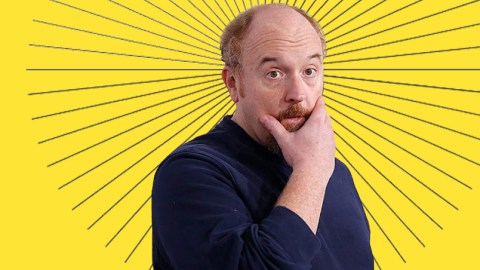Watch What Happened When Scientists and Comedians Mingled at the ‘Comedy Imagination Retreat’

There’s a cardinal rule in comedy: if you have to explain the joke, it ceases to be funny. Attendees at the Comedy Imagination Retreat broke this sacred tenet immediately… but not without good reason. Participants wanted to know if they could better understand the human imagination through an exploration of comedy. Some of comedy’s greatest writers, editors, and performers, mixed it up with researchers to try and answer some of the artform’s biggest questions. The results were a refreshing and thought-provoking look at something that comes naturally to some and is a complete mystery to others.
The comedic figures in attendance were veteran Saturday Night Live writer Cindy Caponera, The Onion’s Editor-in-Chief Scott Dikkers, Second City improviser Aisha Alfa, and former New Yorker cartoon editor Bob Mankoff. Scholars included Elizabeth Hyde and Scott Barry Kaufman of the Imagination Institute, Marie Forgeard, a psychologist at McLean Hospital and Harvard Medical School, and Martin Seligman, founder and director of UPenn’s Positive Psychology Center. The event was organized by officials at the Imagination Institute—a nonprofit whose mission is to quantify the human imagination, find a way to test for it, and even develop ways to make us more imaginative.
This is one of 11 retreats in total, taking place over the course of two years. Comedy isn’t the only topic covered: other retreats will focus on leadership, physics, and even spirituality. The overarching goals are developing a better grasp of what imagination and creativity are, how they occur, why some people are more imaginative than others, and how creativity and imagination might be developed in the young. In each retreat, before discussions begin, guests submit to a brain scan and complete a computer-based test. They are also given a series of questions to help guide discussions along. In this particular retreat, questions included: “Where does comedy come from?” “Is laughter a necessary component of comedy?” and “Does being funny lead to happiness?”
One take away is that the comedic process is different for everyone. For instance, The Onion’s Scott Dikkers enjoys sort of a minimalist approach, where writing jokes is the main focus, stripping away the web of associated elements such as timing, facial gestures, body language, and more. He found this freeing, while performer Aisha Alfa found the exact same experience anxiety-inducing, saying she writes jokes and afterward is nervous about them as she can’t tell whether they are funny or not until they’re performed.
There was some disagreement as to whether satire could change minds or even the political zeitgeist of the country. Dikkers believes The Simpsons, The Onion, The Daily Show, and others, have swung the country away from hardcore conservative values. “It’s made people think critically and that’s the only goal a satirist has,” he said. Political cartoonist Mankoff supported this idea, calling satire the “lingua franca” of political life in America today. “You almost can’t move forward without it,” he said. Others seemed skeptical, however.
Dr. Seligman at one point said he started his career studying misery. Now, he’s studying comedy to find out how to increase the well-being of others. But those in the comedic arts took umbrage with his definition. Instead of bringing on well-being, they felt that instead, comedy helped mitigate pain. It celebrates failure in a way. In that sense, it defangs tragedy and makes it okay.
One of the biggest mysteries is the origin of comedic creativity. Is it pain from which comedy springs? Or does tragedy originate from trying to scratch out a living. According to Mankoff, “There are a lot of different hypotheses. One is that it’s a coping mechanism. The other is that a comedy life, being funny for money, is a difficult one.”
Nine out of ten things in life fail, according to Mankoff, including jokes. So keep on trying and sooner or later you’ll pull out a gem. Just like anything else, comedy improves with practice. While some people are naturally funny, they usually developed their style over the course of their lifetime.
Kaufman said one takeaway is that, the more creative people tend to be, the harder it is for them to express their process. He hopes that this research will result in developing more creative people in society, which could lead to better art, music, comedy, and more. Since life also reflects art, such improvements could in turn, have a significant impact on our society, enriching our lives, making them more thoughtful, and even more lighthearted.
To watch highlights of the retreat for yourself, click here:





